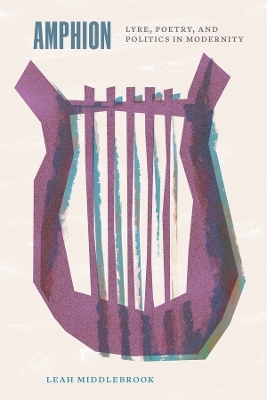
Amphion
Lyre, Poetry, and Politics in Modernity
Seiten
2024
University of Chicago Press (Verlag)
978-0-226-83552-5 (ISBN)
University of Chicago Press (Verlag)
978-0-226-83552-5 (ISBN)
A reintroduction to the myth of Amphion, recovering an overlooked sphere of lyric tradition.
Amphion is the figure in Greek mythology who played so skillfully on a lyre that stones moved of their own accord to build walls for Thebes. While Amphion still presides over music and architecture, he was once fundamental to the concept of lyric poetry. Amphion figured the human power to inspire action, creating and undoing polities by means of language. In contrast to the individual inspiration we associate with the better-known Orpheus, Amphion represents the relentless, often violent, play of harmony and disorder in human social life.
In this wide-ranging study, Leah Middlebrook introduces readers to Amphion-inspired poetics and lyrics and traces the tradition of the Amphionic from the Renaissance through modernist and postmodern poetry and translation from the Hispanic, Anglophone, French, Italian, and ancient Roman worlds. Amphion makes a significant contribution to scholarship on the connection between poetry and politics and the history of the lyric, offering an account well-suited to our times.
Amphion is the figure in Greek mythology who played so skillfully on a lyre that stones moved of their own accord to build walls for Thebes. While Amphion still presides over music and architecture, he was once fundamental to the concept of lyric poetry. Amphion figured the human power to inspire action, creating and undoing polities by means of language. In contrast to the individual inspiration we associate with the better-known Orpheus, Amphion represents the relentless, often violent, play of harmony and disorder in human social life.
In this wide-ranging study, Leah Middlebrook introduces readers to Amphion-inspired poetics and lyrics and traces the tradition of the Amphionic from the Renaissance through modernist and postmodern poetry and translation from the Hispanic, Anglophone, French, Italian, and ancient Roman worlds. Amphion makes a significant contribution to scholarship on the connection between poetry and politics and the history of the lyric, offering an account well-suited to our times.
Leah Middlebrook is associate professor of comparative literature and Romance languages at the University of Oregon. She is the author of Imperial Lyric: New Poetry and New Subjects in Early Modern Spain, and coeditor of Poiesis and Modernity in the Old and New Worlds.
List of Figures
A Note on Orthography and Translations
Preface: The Myth
Introduction: Clarinda’s Stones
Chapter 1 The Lyre and the World
Chapter 2 Mercurial Translatio: Amphionic Lyric Poetics from Du Bellay to Trevor Joyce
Chapter 3 How to Do Things with Copia
Chapter 4 Amphion in the Americas
Coda: Amphion Dancing
Acknowledgments
Notes
Bibliography
Index
| Erscheinungsdatum | 29.11.2024 |
|---|---|
| Reihe/Serie | Thinking Literature |
| Zusatzinfo | 6 halftones |
| Sprache | englisch |
| Maße | 152 x 229 mm |
| Gewicht | 340 g |
| Themenwelt | Literatur ► Lyrik / Dramatik ► Lyrik / Gedichte |
| Geisteswissenschaften ► Sprach- / Literaturwissenschaft ► Anglistik / Amerikanistik | |
| Geisteswissenschaften ► Sprach- / Literaturwissenschaft ► Literaturwissenschaft | |
| Sozialwissenschaften ► Pädagogik | |
| ISBN-10 | 0-226-83552-9 / 0226835529 |
| ISBN-13 | 978-0-226-83552-5 / 9780226835525 |
| Zustand | Neuware |
| Haben Sie eine Frage zum Produkt? |
Mehr entdecken
aus dem Bereich
aus dem Bereich
Deutsche Gedichte aus zwölf Jahrhunderten
Buch | Hardcover (2023)
C.H.Beck (Verlag)
28,00 €
Text, Übersetzung, Melodien, Kommentar
Buch | Softcover (2024)
De Gruyter (Verlag)
24,95 €


